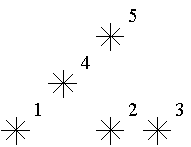Stars
Time Limit : 2000/1000ms (Java/Other) Memory Limit : 65536/32768K (Java/Other)
Total Submission(s) : 20 Accepted Submission(s) : 14
Font: Times New Roman | Verdana | Georgia
Font Size: ← →
Problem Description
Astronomers often examine star maps where stars are represented by points on a plane and each star has Cartesian coordinates. Let the level of a star be an amount of the stars that are not higher and not to the right of the given star. Astronomers want to know the distribution of the levels of the stars.

For example, look at the map shown on the figure above. Level of the star number 5 is equal to 3 (it's formed by three stars with a numbers 1, 2 and 4). And the levels of the stars numbered by 2 and 4 are 1. At this map there are only one star of the level 0, two stars of the level 1, one star of the level 2, and one star of the level 3.
You are to write a program that will count the amounts of the stars of each level on a given map.

For example, look at the map shown on the figure above. Level of the star number 5 is equal to 3 (it's formed by three stars with a numbers 1, 2 and 4). And the levels of the stars numbered by 2 and 4 are 1. At this map there are only one star of the level 0, two stars of the level 1, one star of the level 2, and one star of the level 3.
You are to write a program that will count the amounts of the stars of each level on a given map.
Input
The first line of the input file contains a number of stars N (1<=N<=15000). The following N lines describe coordinates of stars (two integers X and Y per line separated by a space, 0<=X,Y<=32000). There can be only one star at one point of the plane. Stars are listed in ascending order of Y coordinate. Stars with equal Y coordinates are listed in ascending order of X coordinate.
Output
The output should contain N lines, one number per line. The first line contains amount of stars of the level 0, the second does amount of stars of the level 1 and so on, the last line contains amount of stars of the level N-1.
Sample Input
5 1 1 5 1 7 1 3 3 5 5
Sample Output
1 2 1 1 0
Source
Ural Collegiate Programming Contest 1999
/*
POJ 2352 Stars
就是求每个小星星左小角的星星的个数。坐标按照Y升序,Y相同X升序的顺序给出
由于y轴已经排好序,可以按照x坐标建立一维树状数组
*/
#include <iostream>
#include<cstdio>
#include<cstring>
#include<algorithm>
using namespace std;
int ans[15005]; //统计数组
int tree[32005]; //树状数组
int i,n,x,y,t,num;
int lowbit(int k)
{
return k&(-k);
}
int sum(int i)
{
int s=0;
while (i>0)
{
s=s+tree[i];
i=i-lowbit(i);
}
return s;
}
void add(int i,int val)
{
while(i<=32000)
{
tree[i]=tree[i]+val;
i=i+lowbit(i);
}
return;
}
int main()
{
while(~scanf("%d",&n))
{
memset(tree,0,sizeof(tree));
memset(ans,0,sizeof(ans));
for(i=1;i<=n;i++)
{
scanf("%d%d",&x,&y);
num=sum(x+1);
ans[num]++;
add(x+1,1);
}
for(i=0;i<=n-1;i++)
printf("%d\n",ans[i]);
}
return 0;
}